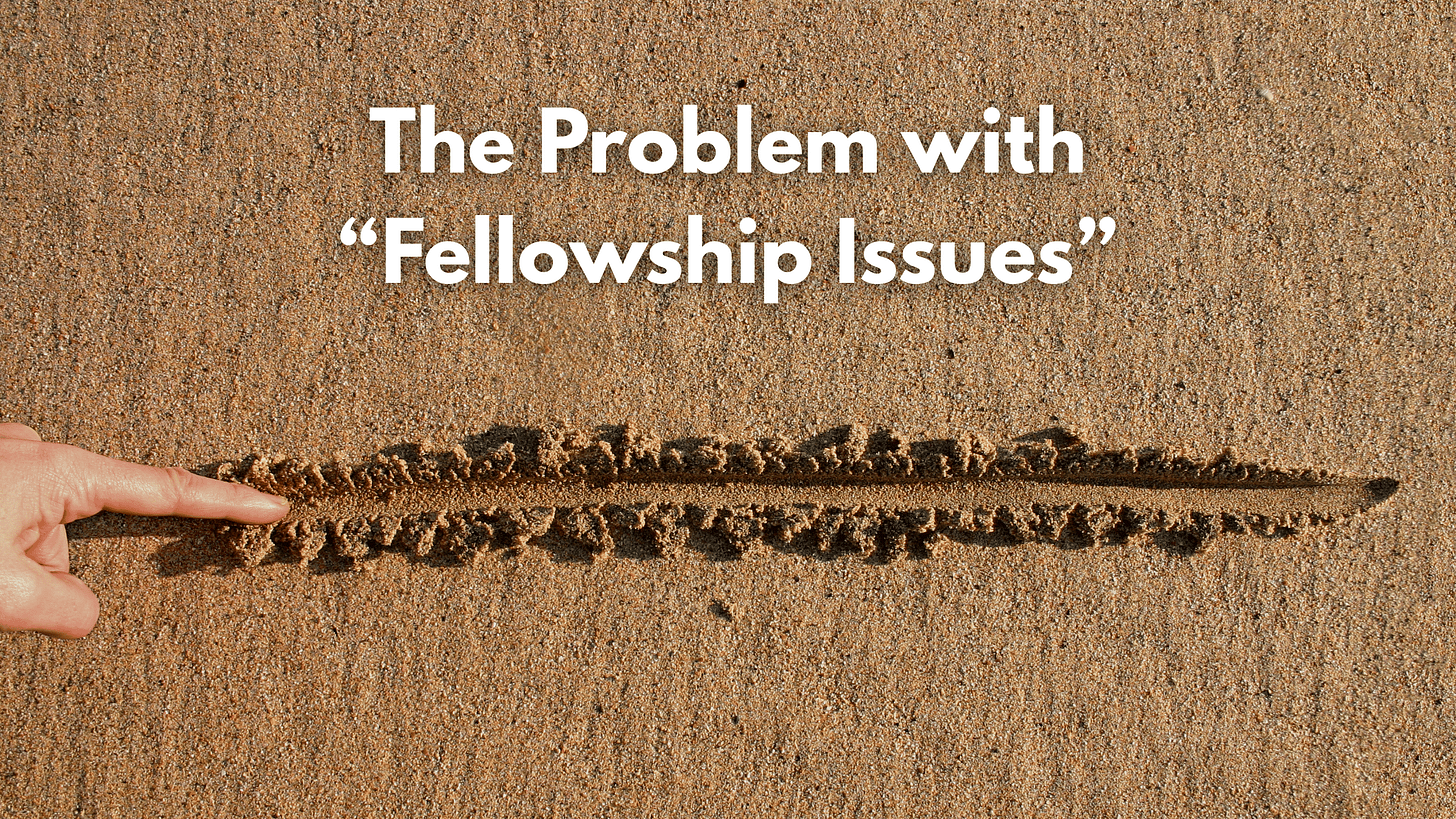The Church of Christ's Problem with "Fellowship Issues"
Broken incentives
Years ago, in what may have been the church of Christ’s biggest viral video, Rick Atchley set out some chairs and took a swing at some sacred cows in the process.
In a visual reenactment of the classic “die, heretic!” joke, each chair represented a theological position within the churches of Christ. And with every succeeding chair, all of the chairs to its left weren’t conservative enough. “Thank goodness you stand against praise teams… but your church has a Bible class?!?”
There’s only one glaring issue.
Rick never points out which chair he would consider beyond fellowship.
His chairs ranged from pro-instrumental music on the left to anti-communion cups, buildings, class, preachers, etc. on the right. But what about the chair to his left?
To be fair, despite this problem, the illustration does make a good point. There’s a lack of clarity in our hermeneutic that can lead people to a rightward narrowing of the faith to a rather small box. We’ll look at that in a minute.
However, his mockery of the slippery slope doesn’t mean there isn’t one.
Both sides are goaded onward by dangerous incentives.
On the progressive end, the leftward drift is all about who will accept the most, fastest. For example, let’s say a church decides “In the name of loving and including our women, we’ll let them co-teach small groups with their husbands. It’s not like they’re preaching or anything.”
That sets you a couple years away from somebody pointing out that, while that move was “loving” toward the women, they still aren’t being loved and included enough. Co-teaching isn’t sufficient. We need women heading up ministries and teaching classes for both men and women.
But guess what? We’ve still yet to become inclusive enough. And now the most “loving” faction of the church is ready to throw some weight around and point out the hypocrisy of the rest. Yep—it’s time for a woman preacher.
There’s a one-upmanship in progressivism that creates a race to be the “nicest, most loving” in the church by being the most open to tearing down doctrinal walls.
But, as Atchley pointed out, the conservative wing is not immune to this same one-upmanship. The only difference is the incentive.
Rather than trying to win the blue ribbon for being the most inclusive, the hyper-conservative’s honor is to be the most exclusive.
The non-institutionalism he pointed to in the illustration isn’t the only manifestation of this impulse. In fact, it’s often seen in an attempt to eliminate all gray areas and matters of opinion. Romans 14 might as well not exist in this rightward competition.
Anybody who says eschatology, alcohol, celebrating holidays, and a number of other topics are up for debate and Christians can allow for disagreement on them? That’s a dangerous heretic. They might not even practice anything different than me, but if they allow somebody to take a different stand they’re “not sound.” Give me a break.
In the “give me the list of dos and don’ts” hermeneutic, it makes sense that appeals to wisdom and allowance for disagreement would be a grave threat. The whole system comes toppling down if you realize the Bible gives a fairly short list of essentials and leaves a whole other realm of Christianity to wisdom and maturity.
Thus, the rightward drift to be the “holiest,” the guy who has eliminated all need for wisdom.
This incentivizes young preachers not to be the best personal workers, or the best Bible students, but to be the best rule enforcers and heresy hunters. The way to a cushy lectureship spot is to zero in on doctrinal hot-buttons, and taking a scalp or two from brothers who dare disagree along the way. Does this seem like a good idea to you?
Neither side has any brakes, and both cars are heading toward cliffs. The leftward edge will coddle itching ears and accommodate the world to the point of allowing anything, because they sure don’t want to be unloving.
The right will draw an ever-tightening circle to the point that nobody but a few buddies are pure enough to be saved, because you can’t possibly be sound if you allow that you might be wrong about something.
The left will eventually eliminate the notion of “fellowship issues,” and the right will tag so many things “fellowship issues” that there will be no fellowship left to be had.
There has to be a balance here.
I’ll float my proposed solution. If you have a better one, I’m genuinely open to hearing it.
As I see it, there’s really only one way to balance these incentives, and that’s to make clear what you/we consider to be the essentials. Everybody needs to know the non-negotiables of what constitutes a Christian. Then, figure out the essentials that establish lines of church fellowship.
And then… WRITE IT DOWN.
Yes, I’m a serious advocate of churches writing down their beliefs of what is non-negotiable and what will be taught in their congregation.
Don’t call it a “creed” or a “confession” if those terms make you uncomfortable. I don’t care. But until we write it down the left side can keep pulling requirements away, and the right side can keep piling them on.
If we were to write it down, it would cause us to do two things:
First, it would cause us to figure out what is non-negotiable.
As we’ve seen from the progressives and their leftward swim, their unwritten list gets smaller and smaller. It should be no surprise when we see the pictures of churches with rainbow flags out front. It was merely a matter of time when your #1 rule is keeping the peace and not hurting feelings rather than conforming to the Word.
Unless you have the non-negotiables firmly in place, compromise is inevitable. Every time you see one of these progressive churches bend the knee to the culture again, realize it’s because there are no brakes in place. They get to make it up as they go.
Second, it would cause us to think through just how much importance we’re placing on one disagreement.
If your list of non-negotiables is a mile long and ends up as “everybody has to agree with me on every issue or they might not be saved,” it would probably cause you to rethink some things.
In other words, this makes us bring Matthew 7:2 into the equation. If I’m going to base fellowship on a standard of perfection in all primary, secondary, and tertiary issues, I had better not be wrong about a single thing.
If I’m going to accuse people of “teaching false doctrine” because they don’t agree with me on alcohol or Christmas, the “false doctrine” measuring stick I’ll be subjected to is going to be awfully daunting. And cutting off fellowship, damaging friendships, uninviting people from church events, and the like, all over the minor 1% you disagree on is a dangerous road to travel.
“But creeds are just written by men and don’t have any authority.”
I don’t know, the unwritten creed that has been used to hurt me, my friends, and countless others sure seemed to carry some authority. Friendships and brotherly relationships lost at the drop of a hat. Word on the street says another brother is going through his round of cancellation right now for preaching his view to the wrong room of people.
When I broke the taboo, I had no way of knowing the issue I touched on was enough for people to withdraw from me. How could I? It’s not written anywhere.
And even worse than the damaged relationships, another result of all this is fear of discussion.
I don’t know when I’ll cross the unwritten creed, so I learn not to open my mouth for fear of being cast out of the circle, so the holier-than-thou one-upmanship and rule-adding only grows.
How about we start writing down which chairs are ok and which ones aren’t? How about, before we decide what is enough to kick somebody out of heaven, we get some wisdom and agreement on the matter and let people know before they cross the line?
Agree? Disagree? I’d love to hear your solutions for stifling the rightward and leftward incentives.
This article was updated from an earlier post, originally written June 2023
Big news!
My new book, You Are Saved: The Christian’s Assurance is out now!




"I’m a serious advocate of churches writing down their beliefs of what is non-negotiable and what will be taught in their congregation."
As one who deals regularly with these conversations, this is wise advice. We may be imperfect at listing the non-negotiables, so we should work hard at it... but, without this list, we will continue to make room for those we should be disciplining. Without spiritual discipline, we also avoid spiritual reconciliation.
First we best have the fellowship of God.
We understand we are Christians in two ways. First and foremost by the written word through command, example and necessary inference. Secondly by understanding the nature of God Rom 1:20. 2Tim 2:15 says there is a right way and a wrong way to divide the Word. Knowledge of the Word is essential 2 Tim 3:15. We meet each Lord's Day twice. We meet on Wednesday nights and for Gospel meetings. We understand we are a part of the body composing the Church and each have different roles. We meet and get there early and talk. We share each others burdens. We worship God. We discuss his word. This is fellowship. If the church practices a thing such as celebrating Christmas. I don't take part.
Philippians 2:12. Each one is to work out our own salvation with fear and trembling. We don't have to agree on everything in matters of opinion. Before we establish written creeds or statements of faith we must realize God has already given us one. Ecc 12:13 and Rev 22:18
We cannot write a profession of faith and bind it. Deu 12:32 Matt 16:19